Chess, often hailed as the ultimate test of intellect and strategy, has historically been dominated by male players. However, female chess players worldwide are challenging the status quo.
In this article, we delve into the stories of various female chess players who have shattered stereotypes, transcended boundaries, and proven that gender is no constraint to conquering the complexities of the chessboard.
Here’s a quick look at our top 10 female chess players:
| Name | Title | Peak ELO Rating |
|---|---|---|
| Judit Polgar | Grand Master (GM) | 2735 |
| Hou Yifan | Grand Master (GM) | 2686 |
| Humphy Koneru | Grand Master (GM) | 2623 |
| Aleksandra Goryachkina | Grand Master (GM) | 2611 |
| Kateryna Lagno | Grand Master (GM) | 2563 |
| Alexandra Kosteniuk | Grand Master (GM) | 2561 |
| Susan Polgar | Grand Master (GM) | 2577 |
| Xie Jun | Grand Master (GM) | 2574 |
| Maia Chiburdanidze | Grand Master (GM) | 2516 |
| Nona Gaprindashvili | Grand Master (GM) | 2376 |
Keep reading to learn more about the achievements of these exceptional female chess players, why chess is still mostly male-dominated, and how can more women play chess professionally.
Top 10 Female Chess Players
Now, let’s delve into the stories and achievements of 10 remarkable female chess players who have risen to the top ranks.
1. Judit Polgar
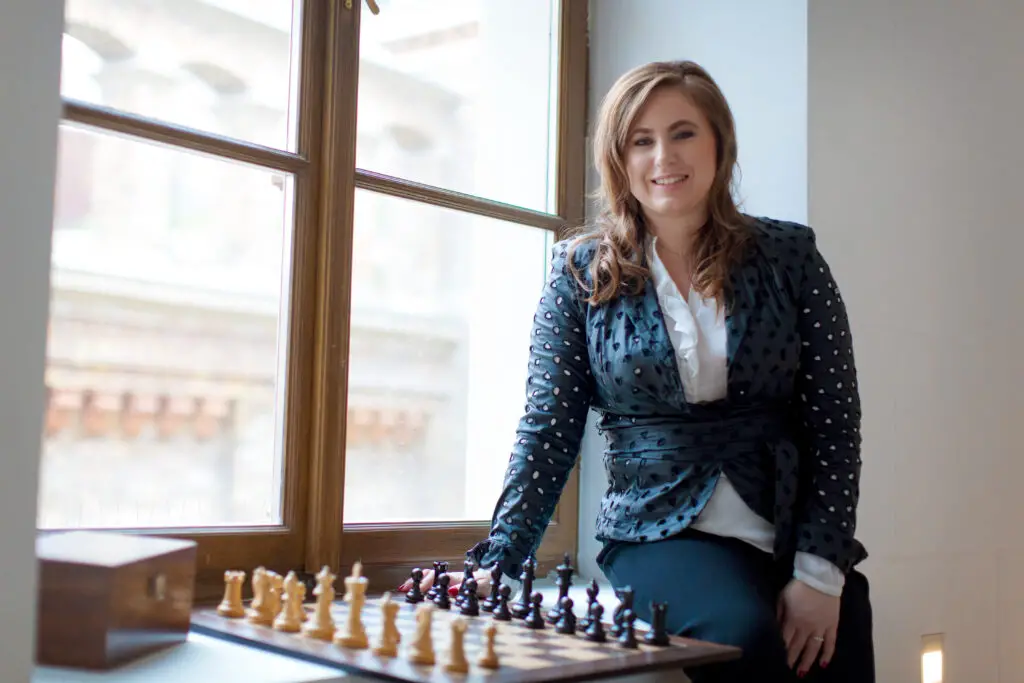
- Peak ELO rating: 2735
- Titles: International Master, Grandmaster
Judit Polgar is widely regarded as one of the strongest female chess players in history. Born in Hungary in 1976, she achieved the title of Grandmaster at the age of 15, breaking the record as the youngest person to do so at that time.
is widely regarded as one of the strongest female chess players in history. Born in Hungary in 1976, she achieved the title of Grandmaster at the age of 15, breaking the record as the youngest person to do so at that time.
She consistently competed against male players and reached a peak ELO rating of 2735, making her highest-rated women in history. Her achievements include defeating multiple World Chess Champions and winning numerous prestigious tournaments.
Achievements:
- Chess Oscar: The Chess Oscar is an award given to the best chess player of the year, as voted by a panel of experts. Polgar won the award twice, in 1996 and 2005.
- Women’s World Chess Championship (1996, 2005): Polgar won the Women’s World Chess Championship in both 1996 and 2005. She was the first woman to win the title twice.
- Grandmaster (GM): Polgar was awarded the title of Grandmaster by FIDE in 1991. She achieved the title at the age of 15 years and 4 months.
- World Chess Hall of Fame (2021): Polgar was inducted into the World Chess Hall of Fame in 2021. This is the highest honor in chess, awarded to the most outstanding chess players of all time.
2. Hou Yifan
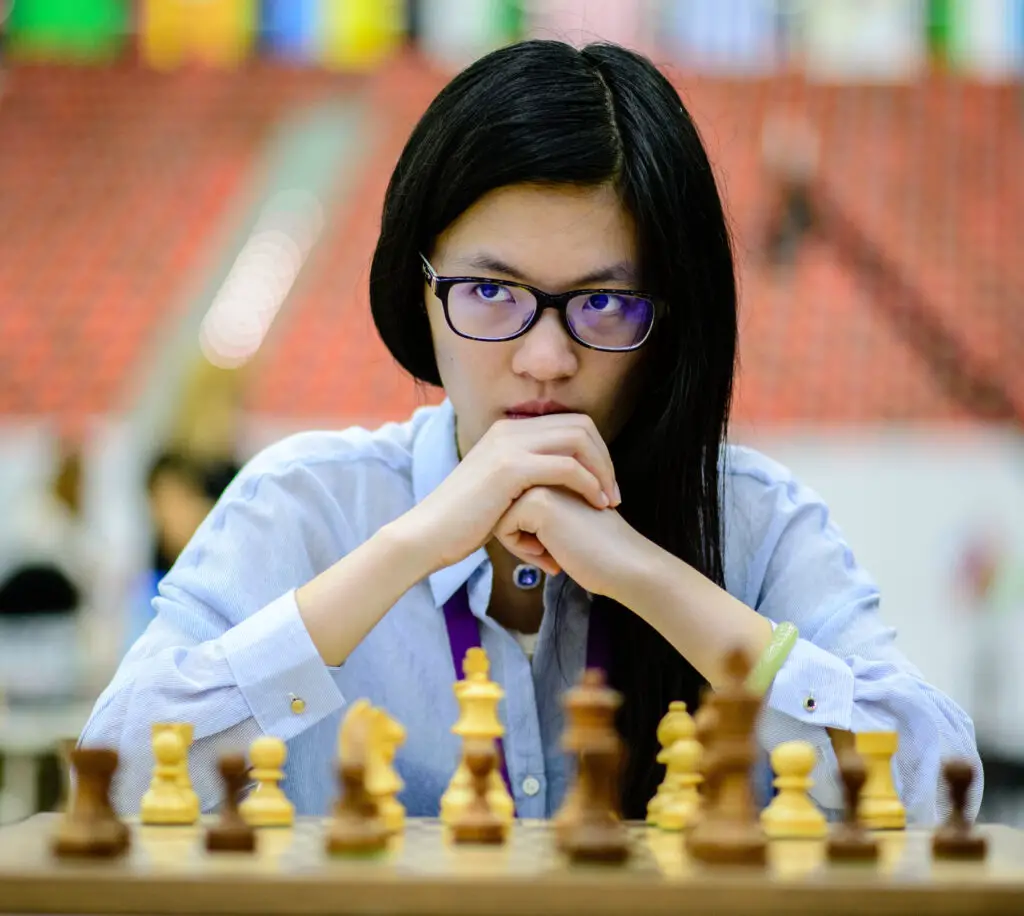
- Peak ELO rating: 2686
- Titles: Woman Grandmaster, Grandmaster
Hou Yifan hails from China and is known for her exceptional talent. She became the youngest female player to earn the title of Grandmaster at the age of 14.
hails from China and is known for her exceptional talent. She became the youngest female player to earn the title of Grandmaster at the age of 14.
Throughout her career, she has dominated women’s chess and has also competed in open tournaments against male players. She has won several Women’s World Chess Championships and has been one of the highest-rated female players for many years.
Achievements:
- Chess World Cup (2016): The Chess World Cup is a tournament held every two years to determine the challenger for the World Chess Championship. Hou Yifan won the tournament in 2016, becoming the first woman to do so.
- Women’s World Chess Championship (2010, 2011, 2013, 2016): Hou Yifan is the most recent four-time Women’s World Chess Champion. She also became the youngest person ever to win the title, achieving it at the age of 16 years and 4 months.
- Grandmaster (GM): Hou Yifan was awarded the title of Grandmaster by FIDE in 2008. She earned the title at the age of 14 years and 7 months.
- Chess Olympiad (2014): Hou Yifan won the gold medal at the Chess Olympiad in 2014 as part of the Chinese team. She also won an individual gold medal on board 1.
- World Chess Hall of Fame (2022): Hou Yifan was inducted into the World Chess Hall of Fame in 2022. This is the highest honor in chess, awarded to the most outstanding chess players of all time.
3. Humpy Koneru
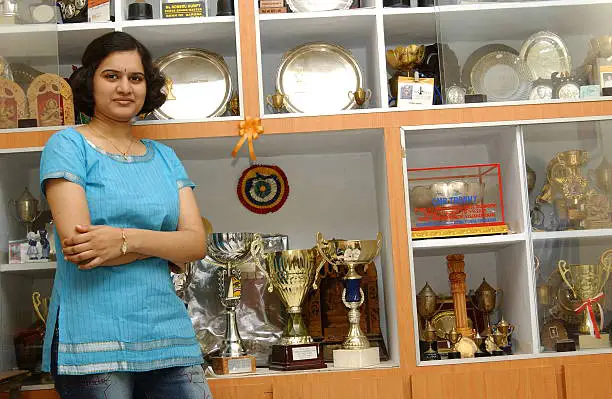
- Peak ELO rating: 2623
- Titles: Woman Grandmaster, Grandmaster
Humpy Koneru , from India, is a prominent figure in women’s chess. She achieved the title of Grandmaster at the age of 15, and she has consistently been among the top female players in the world.
, from India, is a prominent figure in women’s chess. She achieved the title of Grandmaster at the age of 15, and she has consistently been among the top female players in the world.
Koneru has won multiple national and international championships and has represented India in numerous Olympiads.
Achievements:
- Arjuna Award (2003): The Arjuna Award is the third-highest sporting honor in India. Koneru received the award in 2003 for her achievements in chess.
- Padma Shri (2007): The Padma Shri is the fourth-highest civilian award in India. Koneru was honored with this award in 2007 for her contributions to chess.
- Women’s World Chess Championship Runner-Up (2008, 2010, 2012, 2016): Koneru has been the runner-up in the Women’s World Chess Championship four times, making her the only woman to have achieved this distinction.
- Grandmaster (GM): Koneru was awarded the title of Grandmaster by FIDE in 2002. She earned the title at the age of 15 years and 8 months.
- BBC Indian Sportswoman of the Year (2021): Koneru received the BBC Indian Sportswoman of the Year award in 2021, becoming the first chess player to win this accolade.
4. Aleksandra Goryachkina
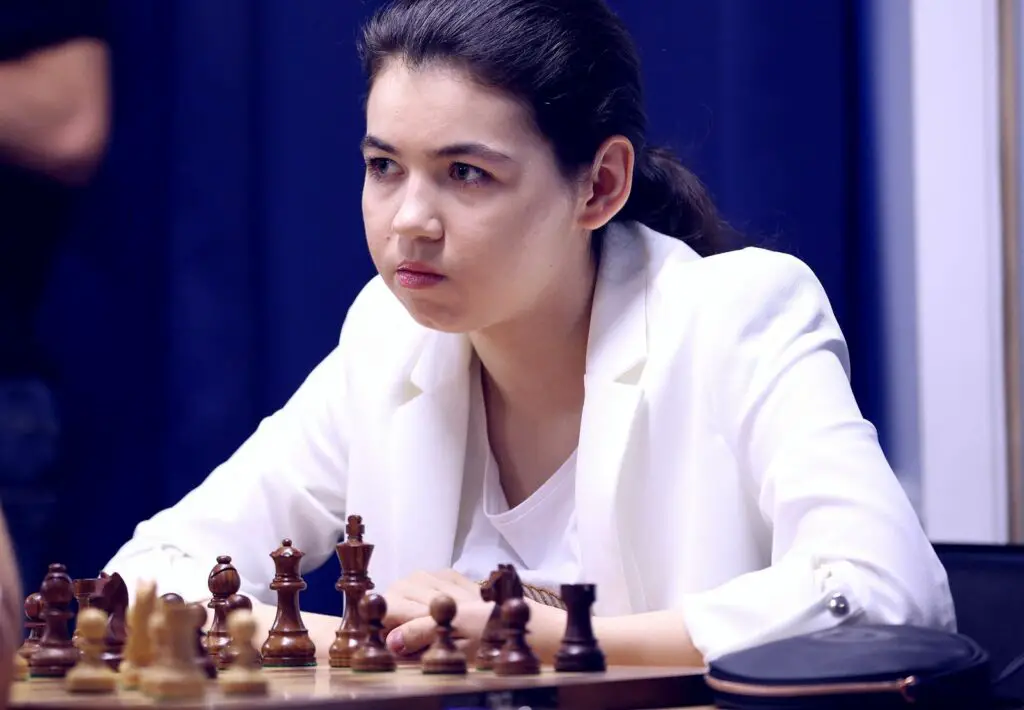
- Peak ELO rating: 2611
- Titles: Woman FIDE Master, Woman International Master, Woman Grandmaster, Grandmaster
Aleksandra Goryachkina is a rising star from Russia. She gained prominence by winning the Women’s Candidates Tournament and earning the right to challenge for the Women’s World Chess Championship title.
is a rising star from Russia. She gained prominence by winning the Women’s Candidates Tournament and earning the right to challenge for the Women’s World Chess Championship title.
She became the Women’s World Chess Championship Challenger in 2019, narrowly missing the title against Ju Wenjun.
Achievements:
- Chess Olympiad (2018): Goryachkina won the gold medal at the Chess Olympiad in 2018 as part of the Russian team. She also won an individual gold medal on board 3.
- Grandmaster (GM): Goryachkina was awarded the title of Grandmaster by FIDE in 2014. She achieved the title at the age of 18 years and 2 months.
- Other Tournaments and Championships: Goryachkina has also won many other tournaments, including the World Youth Chess Championship (under-18 girls’ division in 2014), the European Youth Chess Championship (under-18 girls’ division in 2014), and the Russian Chess Championship (2021).
5. Kateryna Lagno
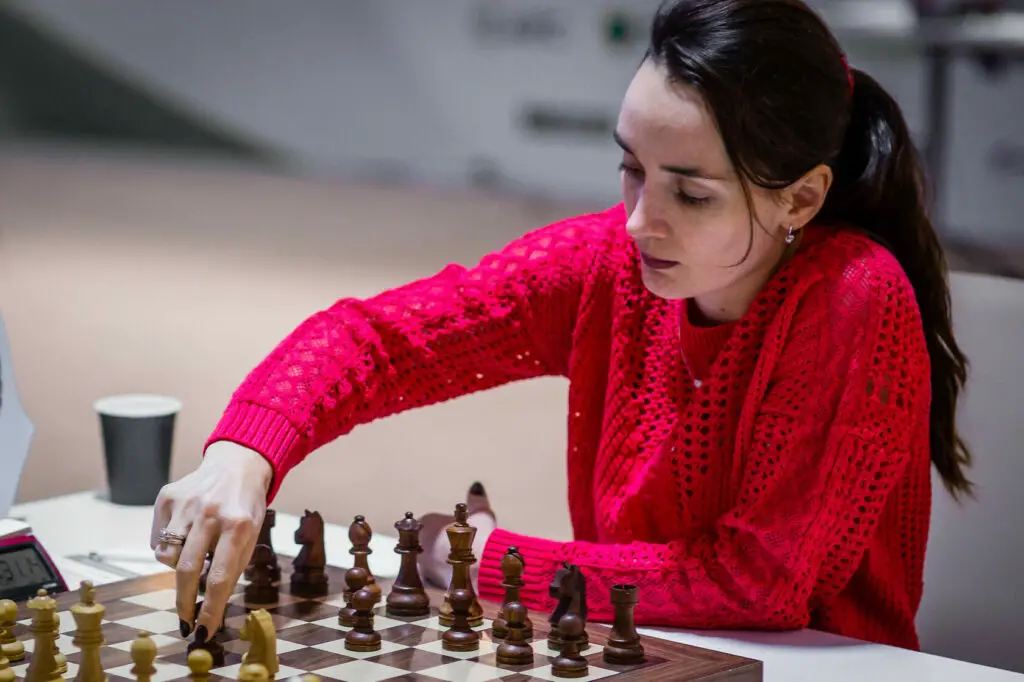
- Peak ELO rating: 2563
- Titles: Woman FIDE Master, Woman International Master, Woman Grandmaster, Grandmaster
Kateryna Lagno is a Ukrainian chess player who has represented Russia since 2014.
is a Ukrainian chess player who has represented Russia since 2014.
She has consistently been a strong player, and her accomplishments include winning the Women’s World Rapid Chess Championship and the Women’s World Blitz Chess Championship, as well as contributing to Russia’s success in team events like the Chess Olympiad.
Achievements:
- Women’s World Chess Championship Runner-Up (2016): Lagno was the runner-up in the Women’s World Chess Championship in 2016, losing to Hou Yifan in the final.
- Grandmaster (GM): Lagno was awarded the title of Grandmaster by FIDE in 2007. She achieved the title at the age of 16 years and 10 months.
- Chess Olympiad (2014): Lagno won the gold medal at the Chess Olympiad in 2014 as part of the Russian team. She also won an individual silver medal on board 2.
- FIDE Women’s Grand Prix (2018–19): Lagno won the FIDE Women’s Grand Prix in 2018–19, a series of tournaments that determined the challenger for the Women’s World Chess Championship. She qualified for the Candidates Tournament but finished in last place.
6. Alexandra Kosteniuk
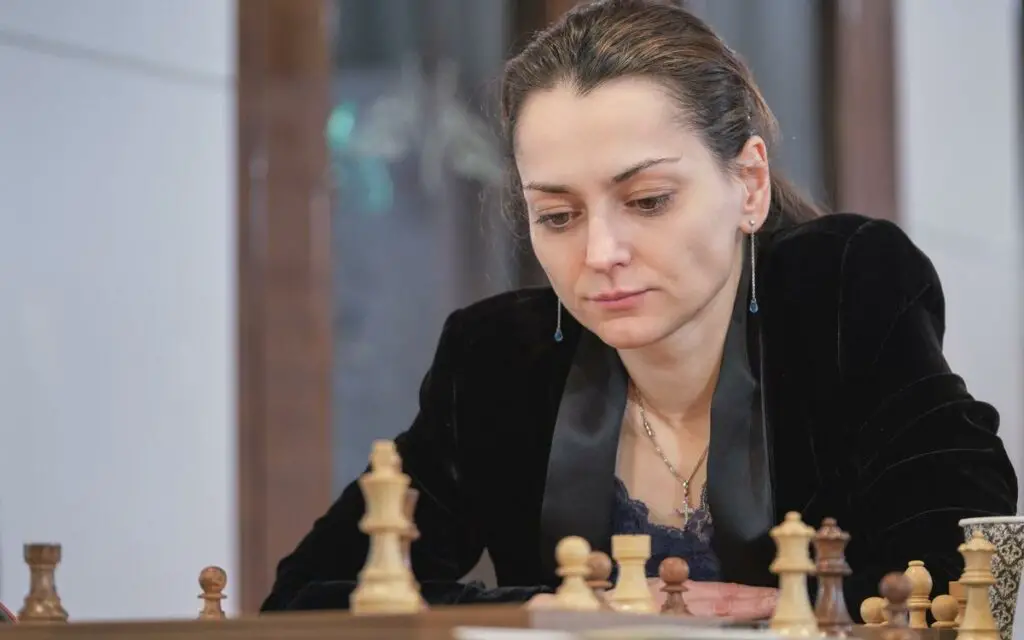
- Peak ELO rating: 2561
- Titles: Woman International Master, International Master, Woman Grandmaster, Grandmaster
Alexandra Kosteniuk from Russia became the Women’s World Chess Champion in 2008 and maintained the title until 2010. She is known for her aggressive and creative style of play.
from Russia became the Women’s World Chess Champion in 2008 and maintained the title until 2010. She is known for her aggressive and creative style of play.
Kosteniuk has represented Russia in numerous chess Olympiads and has consistently maintained a high ELO rating. She’s also an advocate for promoting chess among younger players.
Achievements:
- Women’s World Chess Championship (2008): Kosteniuk became the Women’s World Chess Champion in 2008 by defeating Antoaneta Stefanova in the final. She was the youngest Women’s World Chess Champion since Maia Chiburdanidze in 1976.
- Grandmaster (GM): Kosteniuk was awarded the title of Grandmaster by FIDE in 2004. She became the youngest woman to achieve the title at the age of 14 years and 4 months.
- Chess Olympiad (2014): Kosteniuk won the gold medal at the Chess Olympiad in 2014 as part of the Russian team. She also won an individual silver medal on board 1.
- FIDE Women’s Grand Prix (2015–16): Kosteniuk finished in second place in the FIDE Women’s Grand Prix in 2015–16, a series of tournaments that determined the challenger for the Women’s World Chess Championship. She qualified for the Candidates Tournament but finished in last place.
7. Susan Polgar
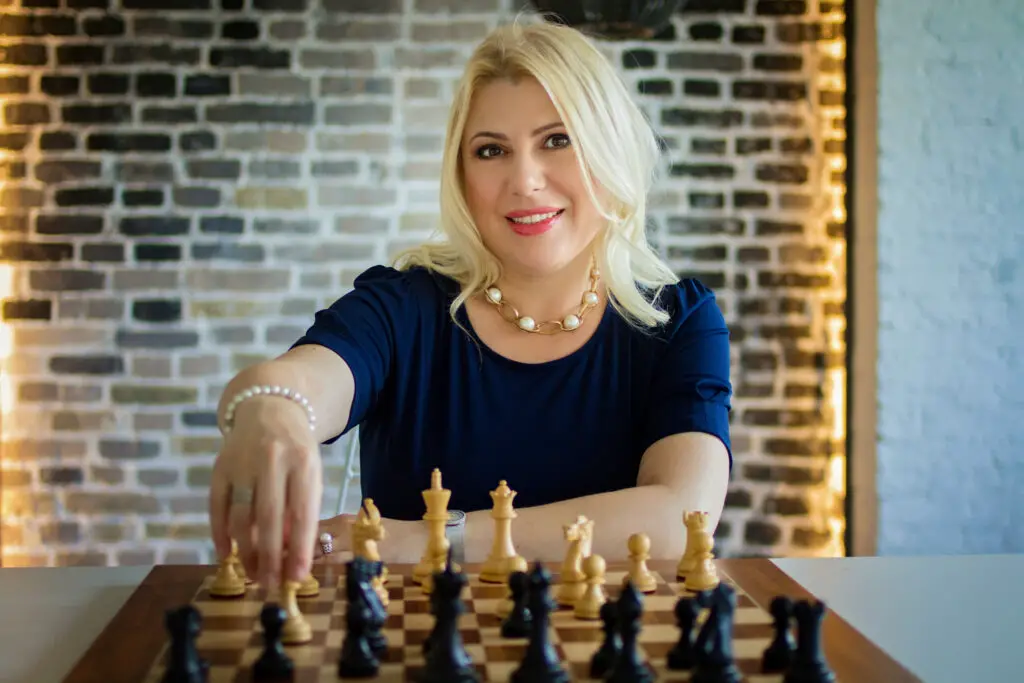
- Peak ELO rating: 2577
- Titles: Woman International Master, International Master, Grandmaster
Susan Polgar , part of the famous Polgar sisters, was the first woman to earn the title of Grandmaster through traditional tournament play. She became the Women’s World Chess Champion in 1996 and was a key figure in popularizing chess in the United States.
, part of the famous Polgar sisters, was the first woman to earn the title of Grandmaster through traditional tournament play. She became the Women’s World Chess Champion in 1996 and was a key figure in popularizing chess in the United States.
Achievements:
- Blitz and Rapid Champion: In 1992, Polgar won both the Women’s World Blitz Championship and the Women’s World Rapid Championship.
- Grandmaster (GM): Polgar was awarded the title of Grandmaster by FIDE in 1991. She achieved the title at the age of 15 years and 4 months.
- Women’s World Chess Championship Runner-Up: Polgar was the runner-up in the Women’s World Chess Championship twice, in 1997 and 1999.
- US Chess Hall of Fame Inductee: Polgar was inducted into the US Chess Hall of Fame in 2020. This is the highest honor in American chess and is awarded to the most outstanding chess players of all time.
8. Xie Jun
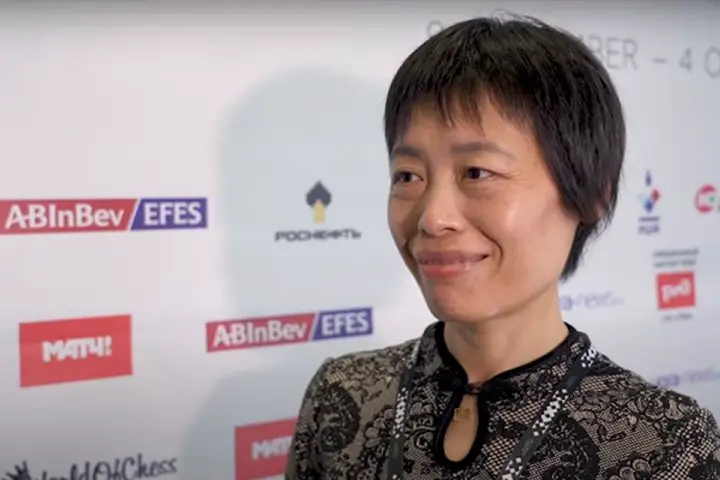
- Peak ELO rating: 2574
- Titles: Woman International Master, Grandmaster
Xie Jun from China achieved the Women’s World Chess Championship title in 1991 and successfully defended it multiple times. Her strategic play and resilience earned her a reputation as one of the strongest female players of her time.
from China achieved the Women’s World Chess Championship title in 1991 and successfully defended it multiple times. Her strategic play and resilience earned her a reputation as one of the strongest female players of her time.
Achievements:
- Women’s World Chess Champion (1996, 1999): Xie Jun became the Women’s World Chess Champion in 1996 by defeating Maia Chiburdanidze in the final. She successfully defended her title in 1999 against Zhu Chen.
- Grandmaster (GM): Xie Jun was awarded the title of Grandmaster by FIDE in 1991. She was the second woman to achieve the title, following Judit Polgar.
- Chess Olympiad (1998): Xie Jun won the gold medal at the Chess Olympiad in 1998 as part of the Chinese team. She also won an individual silver medal on board 1.
- World Chess Hall of Fame (2020): Xie Jun was inducted into the World Chess Hall of Fame in 2020. This is the highest honor in chess and is awarded to the most outstanding chess players of all time.
9. Maia Chiburdanidze
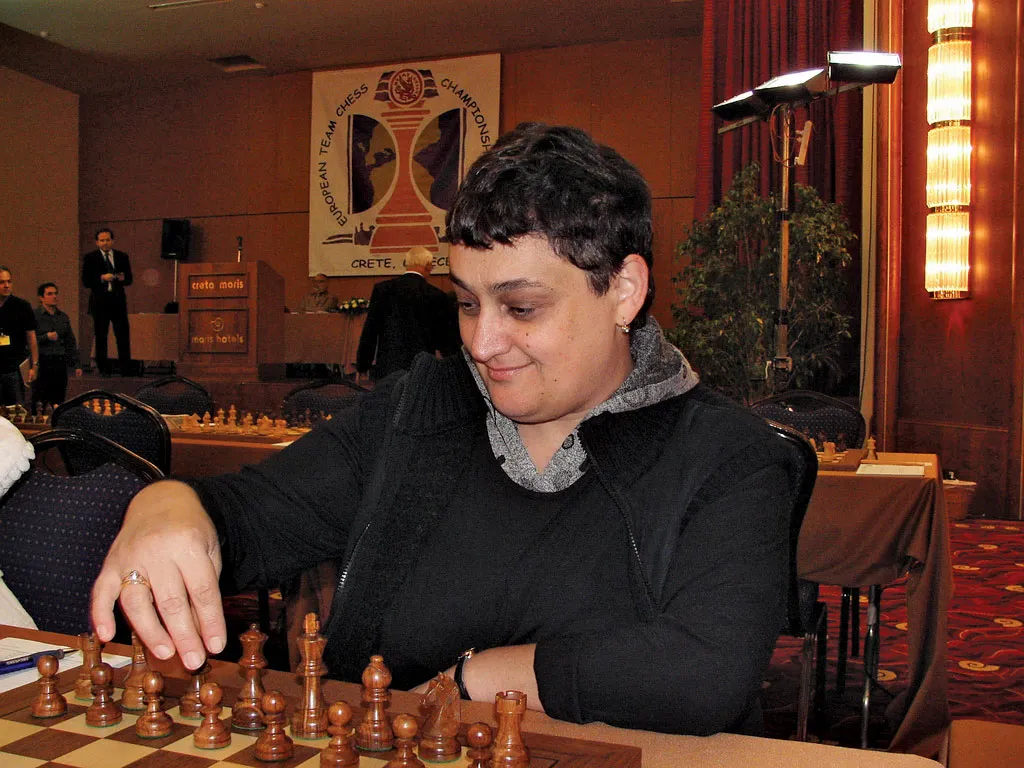
- Peak ELO rating: 2516
- Titles: Woman International Master, Woman Grandmaster, Grandmaster
Maia Chiburdanidze from Georgia became the Women’s World Chess Champion at the age of 17 in 1978. Her victory marked her as the youngest female champion at that time.
from Georgia became the Women’s World Chess Champion at the age of 17 in 1978. Her victory marked her as the youngest female champion at that time.
She was a trailblazer for women in chess and played an influential role in shaping the landscape of women’s chess.
Achievements:
- Women’s World Chess Champion (1976–84, 1986–88): Chiburdanidze was the Women’s World Chess Champion for a total of 8 years, spanning from 1976 to 1984 and again from 1986 to 1988. She is the third woman to hold the title, following Nona Gaprindashvili and Alla Kushnir.
- Grandmaster (GM): Chiburdanidze was awarded the title of Grandmaster by FIDE in 1978.
- Chess Olympiad (1978, 1980, 1982, 1984, 1986): Chiburdanidze won the gold medal at the Chess Olympiad five times as part of the Soviet team. She also won individual gold medals on board 1 in 1978 and 1980.
- World Chess Hall of Fame (2016): Chiburdanidze was inducted into the World Chess Hall of Fame in 2016. This is the highest honor in chess and is awarded to the most outstanding chess players of all time.
10. Nona Gaprindashvili

- Peak ELO rating: 2495
- Titles: Woman International Master, International Mater, Woman Grandmaster, Grandmaster
Nona Gaprindashvili from Georgia is an iconic figure in the history of women’s chess. She was the Women’s World Chess Champion five times between 1962 and 1978.
from Georgia is an iconic figure in the history of women’s chess. She was the Women’s World Chess Champion five times between 1962 and 1978.
Achievements:
- Women’s World Chess Champion (1962–78): Gaprindashvili was the Women’s World Chess Champion for a total of 16 years, from 1962 to 1978. She is the second woman to hold the title, following Vera Menchik.
- Grandmaster (GM): Gaprindashvili was awarded the title of Grandmaster by FIDE in 1978. She was the first woman to achieve this title.
- Chess Olympiad (1963, 1966, 1969, 1972, 1974, 1978): Gaprindashvili won the gold medal at the Chess Olympiad six times as part of the Soviet team. She also won individual gold medals on board 1 in 1963 and 1972.
- World Chess Hall of Fame (2016): Gaprindashvili was inducted into the World Chess Hall of Fame in 2016. This is the highest honor in chess and is awarded to the most outstanding chess players of all time.
These remarkable female chess players have not only achieved remarkable titles and ELO ratings but have also left an enduring impact on the world of chess. Their strategic brilliance, achievements, and dedication have paved the way for other female players, encouraging them to strive for greatness and challenge traditional norms in the pursuit of chess mastery.
Can Women Play Chess Professionally?
Women can and do play chess professionally. In fact, there’s an entire subset of the World Chess Federation (FIDE) dedicated to women’s tournaments, rankings, and titles. Not to mention, countless women have made a significant mark in standard competitions against both male and female opponents.
In recent years, the chess world has witnessed a steady rise in the participation and success of female players, reflecting a changing narrative and an evolving perspective on gender equality within the sport.
Historically, chess has been predominantly male-dominated, with a notable scarcity of women competing at the highest levels. This has often been attributed to a combination of factors, including societal expectations, limited access to resources and training, and the absence of role models to inspire aspiring female players.
These factors have created a perception that chess is a domain best suited for men. However, this perception is gradually being shattered as various female players across the world emerge, armed with skill, ambition, and the determination to challenge the status quo.
Still, it’s important to recognize that while women can undoubtedly play chess professionally, the journey is not without challenges. Gender disparities in resources, sponsorship, and media coverage persist, often making it more difficult for female players to fully realize their potential.
Why Is Chess Still Mostly Male Dominated?
The continued male dominance in chess is a complex issue influenced by a combination of historical, societal, and cultural factors.
While progress has been made to promote gender equality in the game, several key reasons contribute to the ongoing gender disparity:
- Historical Precedence: Chess has a long history that has often been male-dominated. Traditionally, the lack of female representation in the upper echelons of the game has led to a perception that chess is a male pursuit. This historical precedent has, in turn, contributed to fewer women being drawn to chess as a serious endeavor.
- Social Stereotypes: Deep-seated societal stereotypes and biases regarding gender roles can shape perceptions about what activities are considered appropriate for men and women. Chess, with its intellectual demands and competitive nature, has been stereotypically associated with male traits, discouraging some women from participating due to concerns about not fitting societal norms.
- Gendered Learning Environments: In some regions, chess may have been introduced in environments that were predominantly male, making it less inviting for girls to participate. The culture of certain chess clubs, tournaments, or training programs may inadvertently discourage female participation or make it less comfortable.
- Lack of Exposure and Access: Limited access to quality training, resources, and opportunities can hinder female players from reaching their full potential. In some cases, young girls may not be exposed to chess at an early age, resulting in missed developmental opportunities.
- Media and Coverage: Historically, male players have received more media coverage and recognition, reinforcing the perception that chess is primarily a male domain. This imbalance in coverage can perpetuate stereotypes and discourage female players from pursuing the game professionally.
- Bias in Tournament Structures: Some women’s tournaments and events have prize funds and recognition that pale in comparison to those in open tournaments. This can create a perception that women’s events are of lesser importance, affecting the motivation of female players to compete and excel.
Are Men Actually Better Than Women in Chess?
The assertion that men are inherently better than women in chess is not accurate. Chess proficiency is determined by a combination of factors including skill, experience, training, dedication, and strategic thinking, rather than gender. While there has been a historical underrepresentation of women at the highest levels of the game, it’s crucial to emphasize that gender is not a determining factor of chess skill.
The disparity in the distribution of top male and female players can be attributed to a range of social, cultural, and structural factors that extend beyond inherent ability.
Historically, limited opportunities, fewer resources, and cultural biases have affected women’s access to high-level training and participation in competitive tournaments. As a result, fewer women have had the chance to develop their skills to the same extent as their male counterparts.
What Titles Can Women Achieve in Chess?
Women in chess can achieve a range of prestigious titles that signify their expertise and accomplishments within the game. These titles, conferred by chess federations and organizations, serve as benchmarks of skill and mastery. The most notable titles for women in chess include:
- Woman Candidate Master (WCM): This title is often the first significant achievement in a player’s chess journey. It recognizes a certain level of proficiency and understanding of the game’s fundamentals.
- Woman FIDE Master (WFM): Awarded to players who have demonstrated a stronger grasp of chess strategy and tactics, the WFM title represents a higher level of skill compared to WCM.
- Woman International Master (WIM): This title is granted to players who have achieved a solid performance in international competitions. Holding the WIM title signifies a substantial understanding of chess theory and proficiency in competitive play.
- Woman Grandmaster (WGM): A significant achievement, the WGM title indicates a high level of chess expertise. Players with this title have excelled in international tournaments, demonstrating mastery in both strategy and execution.
- Grandmaster (GM): While not a gender-specific title, female players can certainly achieve the highest honor in chess – the Grandmaster title. The GM title is bestowed upon players who consistently perform at an exceptional level against the world’s best competition. Notably, Judit Polgár, Hou Yifan, and a few other women have earned the GM title through their outstanding achievements in mixed-gender events.
It’s important to note that while there are gender-specific titles, such as Woman Candidate Master and others, women are also eligible to earn non-gender-specific titles like International Master and Grandmaster.
The achievements of women like Judit Polgár, who achieved the full Grandmaster title by competing successfully against top male players, emphasize the potential for women to excel in the highest echelons of the game.
What Are the Challenges That Women Face in Chess?
Women in chess face a range of challenges that have historically contributed to gender disparities within the game. So, let’s take a closer look at some of these challenges:
- Limited Role Models: The scarcity of successful female players in top-level competitions has resulted in a lack of visible role models for aspiring women chess players. This absence can make it harder for young girls to envision themselves pursuing a career in chess.
- Stereotypes and Bias: Prevalent stereotypes that associate intellectual games with masculinity can discourage young girls from taking up chess seriously. Biases about women’s capabilities in strategic thinking and competition can also affect their self-confidence and motivation to excel in the game.
- Unequal Opportunities: In some regions, women have had fewer opportunities to access quality training, coaching, and competitive play. The concentration of resources and high-level training among male players can create an uneven playing field.
- Gender-Segregated Tournaments: While women’s tournaments have been created to encourage female participation, they can inadvertently reinforce the notion that women’s chess is distinct from men’s chess. This can lead to a perception that women’s competitions are of lesser importance, affecting their overall recognition and opportunities.
- Disparities in Prize Funds: Prize funds in women’s tournaments are often significantly smaller than those in mixed-gender events. This disparity not only affects financial incentives but also sends a message about the perceived value of women’s accomplishments in chess.
- Lack of Media Coverage: Historically, male players have received more media coverage and recognition, contributing to a perception that chess is primarily a male pursuit. This can limit exposure and recognition for female players..
By acknowledging and actively working to overcome these challenges, the chess world can foster an environment where all players, regardless of gender, have the opportunity to reach their full potential.
What Can Be Done Overcome Gender Inequality in Chess?
Overcoming gender inequality in chess requires a multi-faceted approach that addresses various aspects of the issue. Here are some steps that can be taken:
- Encourage Early Engagement: Promote chess education and engagement among girls from a young age. Schools and chess clubs can create inclusive environments that encourage all children to participate, regardless of gender.
- Provide Equal Opportunities: Ensure that both girls and boys have access to the same resources, training, and competitive opportunities. Offer equal coaching, tournament exposure, and support to foster balanced development.
- Showcase Female Role Models: Highlight the achievements of successful female chess players as role models. Increased visibility of accomplished women can inspire young girls to pursue chess with confidence.
- Mixed-Gender Events: Encourage participation of female players in mixed-gender tournaments. This can help normalize the idea of women competing on equal footing with men and provide valuable learning experiences.
- Equal Prize Funds: Ensure that prize funds in women’s tournaments are commensurate with those in mixed-gender events. Equal recognition for accomplishments is essential to combatting gender bias.
- Mentorship Programs: Establish mentorship programs that connect experienced female players with young talents. Mentorship can provide guidance, support, and a sense of belonging in the chess community.
- Women’s Chess Programs: While working towards inclusivity, continue supporting women’s chess programs that create safe spaces for female players to develop their skills and confidence.
- Media Representation: Ensure equitable media coverage of both male and female players. Highlight achievements regardless of gender to shift perceptions about the role of women in chess.
- Education and Awareness: Conduct workshops, seminars, and awareness campaigns to address gender biases within the chess community. Provide resources to challenge stereotypes and encourage inclusion.
Overcoming gender inequality requires a sustained effort. By implementing these strategies and fostering a more inclusive and supportive environment, the chess community can create a level playing field where talent, dedication, and strategic thinking are the defining factors of success for players of all genders.
Conclusion
As the chess world continues to evolve, the focus is shifting from gender distinctions to acknowledging talent and skill on a level playing field.
Women in chess are making strides and redefining what is achievable, showing that dedication, strategy, and intellect are the true markers of success in this timeless game.
Overall, it’s important to celebrate the accomplishments of all accomplished chess players, regardless of gender, and recognize that the potential for mastery in chess is a result of individual talent, dedication, and opportunity.
